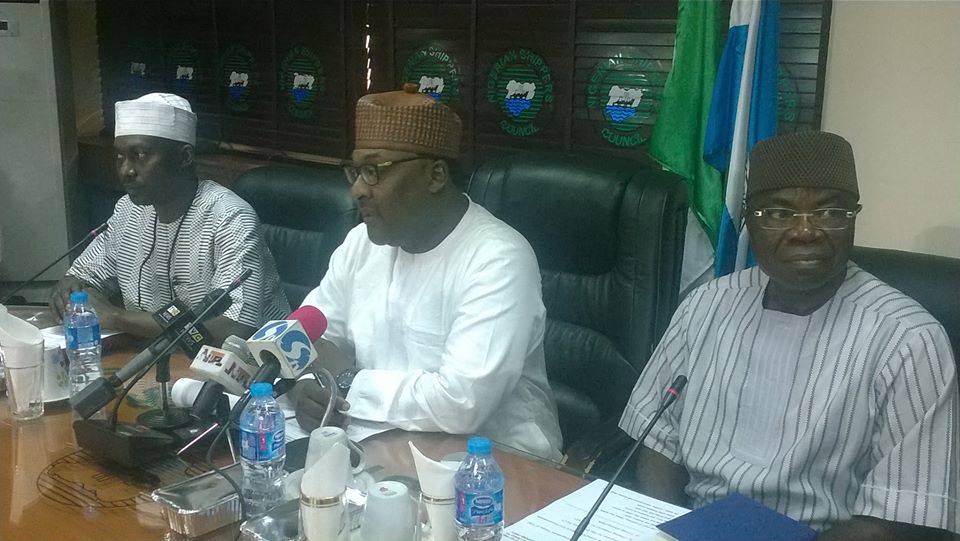The Nigerian Shippers’ Council (NSC) has assured that it will do all within its powers to see that all forms of arbitrary charges at the nation’s seaports will be minimized by the end of the year.
The Executive Secretary of the NSC, Barr. Hassan Bello who disclosed this while fielding questions from journalists on the sidelines of the courtesy visit on the Council by the Manufacturing Association of Nigeria (MAN) in Lagos recalled that one of the core functions of the Council was to moderate the cost of doing business at the ports which he said the Shippers’ Council would stop at nothing to achieve.
According to him,” One of the functions of Shippers’ Council is moderation in cost. As a matter of fact, the essence of privatization of the port is to bring the cost of doing business down comparative to what we have obtained in other climes and you can only do that through negotiations. This I think we have been doing as a matter of fact to see that prices are reasonable, they are competitive because a shipper has a choice where to take his cargo to and the cost of doing that is one of the substantial consideration to bring bear in his decision.
“So, I think we are going to stabilize and let the cost come down together with the service providers, everything we do, we have to get their buy in. So, our regulation is democratic and I am sure we will achieve the same aim we set out to achieve.
“There are some issues as I tell you even the operating environment adds to that, a little infractions here and there but with the Shippers’ Council supervising ad coordinating, I think these things will be minimized towards the end of this year. You will see a lot of coming together, managing tariffs and eliminating of arbitrariness in price fixing”.
On his part, the Director-General of MAN, Mr. Segun Ajayi-Kadir stated that a conducive environment was a requisite for a very successful manufacturing climate adding that there was no country on earth that had become wealthy or developed without a viable manufacturing sector.
Kadir while underscoring the need for appropriate infrastructure to be put in place at the nation’s ports however maintained that lack of infrastructure was part of the reasons the ports in the country were not competitive which in turn forces importers to depend on the ports of the neighbouring countries for their imports of raw materials and machineries.
“But we need a regulator and that is where the Nigerian Shippers’ Council becomes key and with what we have heard from the Executive Secretary and CEO of the Nigerian Shippers’ Council, we are very confident that we will be able to have over a short period of time and it better be short because we are in recession and we need to reflate that economy. We are confident that if he follows through with all he has said, Nigeria is going to bounce back to what we once experienced and be able to achieve the desired goals as spelt out in the Economic Recovery and Growth Plan.
“So, ours is to support them and that was why I mentioned earlier that we going to study very closely what I will call their reform agenda and key into it because we really need that at this time”, the DG said.
Also speaking, the leader of the delegation and Chairman, Corporate Affairs and Strategic Planning Committee of MAN, Chief John Aluya observed that MAN looked at the Shippers’ Council as strategic partner since the maritime sector was key to manufacturing.
He revealed that most of the raw materials used by manufacturers in the country were imported thus the ease of getting them out of the port was of prime importance to them adding that that was the role the Shippers’ Council was playing to ensure the ease of clearing goods from the ports, to reduce the cost of doing business.
While describing the day’ meeting as very strategic to MAN, he however opined that “the ports are not competitive; there is a slow pace of clearing which adds to the cost of doing business. Nigeria is not alone in this league; all we need to do is to come up with full resolution of what we want to do. The port of Acapa in Jordan was worse than Nigerian ports but today, it is one of the most efficient and effective ports, all shipping lines want to call at that port today. Hitherto, they used to spend three months in cleating but today, as soon as they come, they discharge and go because the port is now efficient.
“So, all we ask for is that the Nigerian government should take the bull by the horn to implement processes and procedures that will enthrone efficient port in the nation”.
Send your news, press releases/articles as well as your adverts to info@primetimereporters.com. Also, follow us on Twitter @reportersinfo and on Facebook on facebook.com/primetimereporters or call the editor on 07030661526, 08053908817.

